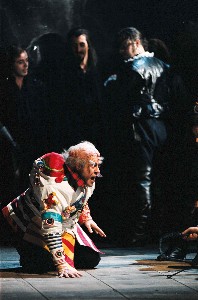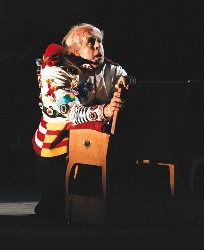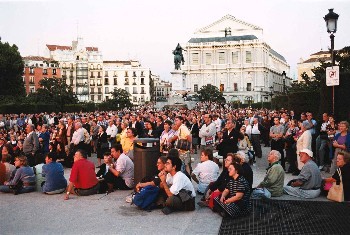
Carlos Alvarez als Rigoletto - Photo: Teatro Real
The night of Carlos Alvarez
For the opening of the 2001/2002-season at the Teatro Real Carlos Alvarez gave his
enthusiastically celebrated debut as Rigoletto, Verdi's tragic court jester and father
figure. The in Malaga born, young Spanish baritone embodied the difficult role as singer
and actor in an incredible intensive way with a sensible, but nevertheless force- and
powerful, beautiful voice.
The Spanish soprano Isabel Rey - though it was not seen by all members of the first
night audience like this - shined at his side as for the Duke self-sacrificing Gilda.
Giuseppe Sabbatini as the womanizing Duke of Mantua showed a solid tenor performance,
though there could have been a bit more brilliance in his voice especially in the
beginning of the premiere performance. Askar Abdrazakov gave his Sparafucile a diabolic
blackness and Enkelejda Shkosa embodied an about the life of the Duke worried Maddalena
with a well-conducted, warm mezzo.

Carlos Alvarez als Rigoletto - Photo: Teatro Real
It had diverse opinions about the performances of the conductor Daniel Lipton, whose
conducting could have been more distinguished and clearer worked out , and of the stage
director Graham Wick. The latter has created together with his stage and costume designer
Paul Brown especially in the first scene at the Court of Mantua a last days, brutal
atmosphere. Lovingly worked out was instead the scene in Gilda's garden, as well as the
splendid costumes. But, even if the opinions about the staging could be controversial,
once again Graham Wick justified his reputation as the music and text respecting stage
director.

La Plaza d'Oriente during the performance (in the back the Teatro Real)
The season's opening, which was witnessed by 1,800 spectators in and about
2,000 outside the Teatro Real watching a big video screen, was given special shine by the
presence of King Juan Carlos I. and Queen Sofia. (bp) top
Commentary
A more stirring, more touching interpretation of the figure of Rigoletto, than Carlos
Alvarez is embodying in the production of Graham Wick, it might not have had in the 150
years of performing this Verdi opera. Piteous already in the appearance, totally
convincingly in his body language and his facial play - it is not anymore Carlos Alvarez
standing on the stage, but an old, broken man, who quarrels with his fate.
Already eight years ago the today 36-year-old Spanish baritone had learned the music
part of the role of Rigoletto for La Scala at Milano. But then he had canceled the role,
because he did not feel matured enough for this part. Ricardo Muti accepted his decision
and meanwhile the two have already made some new productions like Don Giovanni and Le
nozze di Figaro at Vienna. In this eight years the voice has matured and Carlos Alvarez
has become father of two children and he knows, "Today I can much better develop the
feelings of a father and transfer them to the audience. It is like with a good wine. It
had to settle. I have not touched the role for eight years till the moment I knew I was
going to sing it at Madrid. Now it has just taken a month of work to have the part present
again." That he interprets the role also so perfectly as an actor, he gives a lot of
credits to the stage director Graham Wick, "I tried to come to the first rehearsal
like a virgin. I knew at that time already the make-up, which plays an important part for
the structure of the role. I knew, of course, the music and the libretto, but I did not
want to force my opinion about the role and my direction on the production and this was
good. Graham Wick and I we read together very carefully the libretto and at the same time
we worked out each feeling, which is conveyed by the music Then it was pretty easy to
develop our interpretation."
Carlos Alvarez feels very comfortable in the production of Graham Wick, with whom he
had already worked together for the '98 new production of Verdi's Ernani at the Vienna
State Opera, in which he gave the part of Don Carlos. The Rigoletto new production of the
Teatro Real at Madrid took place in cooperation with other opera houses like the Maggio
Musicale, the Gran Teatro de Liceo and the Teatro Massimo de Palermo (Dec. 2001) and
therefore Carlos Alvarez will be seen in the title role also at Firenze (Nov. 2003) and at
Barcelona (Nov. 2004).
That Graham Wick's production would not absolutely meet the taste of the Madrid
audience, did not surprise, since he had given it in large parts an extremely gloomy and
brutal atmosphere. The observation that one might believe to be in a Mad-Max-movie
especially in the first scene at the festivities in the duke's palace, the British stage
director enjoedy. The outfit of the courtiers and their behavior remembered of a rocker
gang, while the ladies were clothed in splendid costumes. The morbid atmosphere, the
reprehensible, even fatal activities - without doubt very timeless - grips the spectator
from the first moment, as he can very well follow the story as Wick has staged it without
knowing the text of the libretto. In contrast to the customs and way of life at the court
stands Gilda's home with a lovely portrayed garden and parts of the house, where the
religious props can be seen confirming Gilda's adjustment to a decent, on the church
concentrated life.
Graham Wick's Gilda is not shown behind iron bars like in a cage. The walls of the
revolving stage representing the high walls around the garden and house are open towards
the audience - a total shielding from the environment will not exist and does not exist -
even the going to church on Sundays and holidays turns out to be a deceptive trap. How
much love Gilda owns for her crippled father shows when she washes him tenderly his bloody
hump on his back. A scene, small but brilliant, which might not exist in any other
production in this way.
Another moment, in which Wick becomes more distinct than most of his colleagues is the
end of the second act and the beginning of the third act. What happens exactly between the
last scene in the palace, when Rigoletto swears revenge to the duke and tries to take his
kidnapped and seduced daughter home, while she still implores her father for pity for her
lover and keeps to her love for the duke, and the beginning of the third act, when
Rigoletto brings Gilda to the tavern of Sparafucile to convince her about the disloyalty
of the duke, the libretto does not exactly tell. One knows that some time has passed, that
Gilda still loves the duke and that she is convinced that he loves also her. Graham Wick
makes a clear statement: Gilda tears off her father at the end of the second act and stays
sitting on the duke's bed, while her father leaves the palace. Even more distinct becomes
the first scene of the third act: Gilda wears not anymore her modest dress of the first
act, but is spruced up in a dress of the ladies-in-waiting when she comes to the tavern.
There is no doubt, she has spent the time inbetween at the court as the lover of the duke,
who looks now for new love adventures. A very obvious interpretation.
What is many times disturbing throughout the performance is the noise the revolving
stage makes when turning. Unfortunately it happens also during some solo-arias with few
orchestra accompaniment. But this cannot be made as reproach to the stage director.
Normally one is supposed to use the existing stage technique, what makes a performance
also more interesting.
The choir of the Teatro Real was very well rehearsed by Martin Merry. The orchestra
offered under the baton of Daniel Lipton a great performance. It almost breathed with the
singers, what sometimes goes on the expenses of the precision, but makes the performance
to a completely rounded piece of work.
Birgit Popp
P.S.: Since the beginning of his career, which started in the Teatro de la Zarzuela at
Madrid, Carlos Alvarez stands up for the Zarzuela, the Spanish song play, which is settled
somewhere between operetta and opera. How varied the many types of the Zarzuela are,
Carlos Alvarez shows on his newest CD 'Zarzuela Gala', which had been
released by RBA in October 2001. More information can be taken from www.rba.es (in Spanish and English)